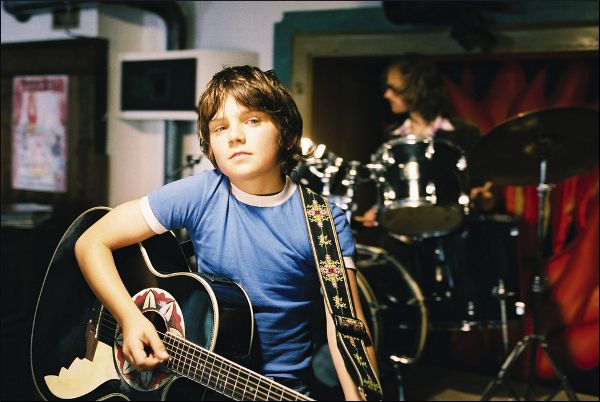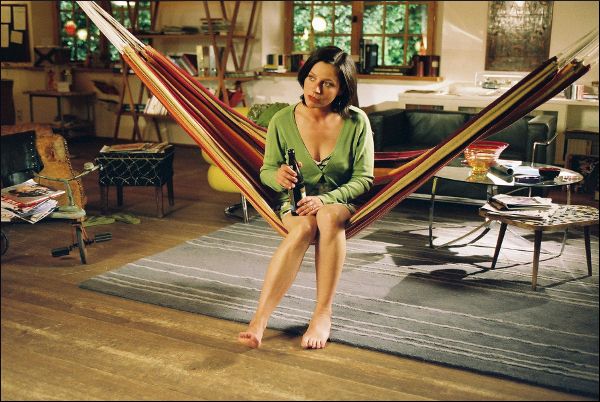Following several short films, such as Nur Schreiner machen Frauen glücklich (Only Carpenters Know How to Make Women Happy), Marcus H. Rosenmüller made his big cinema debut with the Bavarian film Wer früher stirbt ist länger tot (internationally distributed as Grave Decisions, although the literal translation of the title is "The sooner you die, the longer you're dead"). It tells the story of Sebastian Schneider, who lives with his father Lorenz, the owner of a typically Bavarian guesthouse or bar, and his brother Franz in the fictional town of Germringen. The setting is in fact the Wendelstein region of Chiemgau, in the southern German state of Bavaria.
Hoping to spare him the emotional trauma, Lorenz and Franz tell Sebastian that his mother died in an accident. But when Sebastian accidentally kills Franz’s beloved rabbit Karl, Franz tells Sebastian that his mother actually died while giving birth to him. Franz blames Sebastian for the loss of their mother, and Sebastian is filled with immense guilt. One night, he is told by a group of rowdy regulars at his father’s bar that people who commit too many sins suffer for them in purgatory. Knowing he has already committed too many, being the "Lausbub" that he is (a Bavarian word for “cheeky boy”), Sebastian is on a mission: not to die.
"Bavarian accents make even the saddest and most complicated topics enjoyable."
Trying to rectify Karl’s death, Sebastian tries to bring him back to life with shock therapy. His school friend, Evi, watches and is splattered with blood when the experiment fails miserably. Sebastian is haunted by nightmares, in which he is sentenced to 14 years of purgatory on Judgment Day. The judges are local regulars from his father’s bar, and though the scenery is rather scary, the dialogue is extremely comical. While the locals want nothing but the best for Sebastian and genuinely hope to offer great advice, they are tactless, grumpy, and entirely too blunt for the likes of a young boy. Their Bavarian accents make even the saddest and most complicated topics enjoyable. In his dreams, they accuse him of not caring for his father, saying “Der is ‘erm scheiss Wurst!” (He doesn’t give a crap about him). In Bavarian, the term "Wurst" (sausage) is used for “never mind” or “I don’t care” (mir Wurst).

Thus, Sebastian is looking to find ways of becoming immortal. On a school trip to the local radio station, he finds out from the eccentric radio DJ, Alfred, that one way of doing so is to make music. Inspired by the idea, he digs out his mum’s old guitar, which causes further conflict in the household. He then turns to the cracker-barrel crowd in his father’s bar, which informs him of yet another way to become immortal: to reproduce. Not entirely sure of what this may entail, he asks the regulars how exactly he may go about this, to which one replies: all you need to do is find a pretty girl, bite her earlobe softly, and whisper “Dadn Sie eventuell mit mir Vögeln?”
"Wer früher stirbt ist länger tot captures the humour and culture of Bavaria beautifully."
“Vögeln” is slang for having sex, much like the term “shagging” or “screwing” in English. Although it is not Bavarian slang per se, it is very popular in the area. Sebastian tries to put this line to the test with his young, pretty teacher Veronika, who is shocked by his approach. She decides to pay Lorenz a visit in his guesthouse, but finds him in a strange position upon arrival, hiding under tables from Evi’s mother, who has had a thing for him for a long time. While “Hoch Deutsch”, the clear German accent taught at schools, has a soft and polite tone, Bavarian is more aggressive and sloppy. Sebastian’s teacher Veronika is very well-spoken, whereas Lorenz speaks the local tongue. The difference in language seems to reveal a difference in personality, but despite the contrast, they end up falling for each other. Convinced that by getting his father and teacher together he will make up for past sins, Sebastian sets off on a final mission.
Wer früher stirbt ist länger tot captures the humour and culture of Bavaria beautifully. The film paints a realistic picture of “Das Leben auf dem Land” (or country life) and the various characters one might come across there. The close knit and natural feeling of small Bavarian mountain villages is depicted with such authenticity, that it allows viewers to get a true sense of the lifestyle and mentality of southern Germany.





